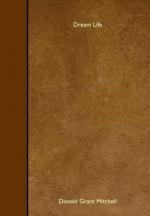There are thousands of mole-eyed people who count all passion in print a lie,—people who will grow into a rage at trifles, and weep in the dark, and love in secret, and hope without mention, and cover it all under the cloak of what they call—propriety. I can see before me now some gray-haired old gentleman, very money-getting, very correct, very cleanly, who reads the morning paper with unction, and his Bible with determination,—who listens to dull sermons with patience, and who prays with quiet self-applause; and yet there are moments belonging to his life, when his curdled affections yearn for something that they have not,—when his avarice oversteps all the commandments,—when his pride builds castles full of splendor; and yet put this before his eye, and he reads with the most careless air in the world, and condemns as arrant fiction, what cannot be proved to the elders.
We do not like to see our emotions unriddled: it is not agreeable to the proud man to find his weaknesses exposed; it is shocking to the disappointed lover to see his heart laid bare; it is a great grief to the pining maiden to witness the exposure of her loves. We do not like our fancies painted; we do not contrive them for rehearsal: our dreams are private, and when they are made public, we disown them.
I sometimes think that I must be a very honest fellow for writing down those fancies,—which every one else seems afraid to whisper. I shall at least come in for my share of the odium in entertaining such fancies: indeed I shall expect the charge of entertaining them exclusively, and shall scarce expect to find a single fellow-confessor, unless it be some pure and innocent-thoughted girl, who will say peccavi to—here and there—a single rainbow fancy.
Well, I can bear it; but in bearing it, I shall be consoled with the reflection that I have a great company of fellow-sufferers, who lack only the honesty to tell me of their sympathy. It will even relieve in no small degree my burden to watch the effort they will take to conceal what I have so boldly divulged.
Nature is very much the same thing in one man that it is in another; and, as I have already said, Feeling has a higher truth in it than circumstance. Let it only be touched fairly and honestly, and the heart of humanity answers; but if it be touched foully or one-sidedly, you may find here and there a lame-souled creature who will give response, but there is no heart-throb in it.
Of one thing I am sure:—if my pictures are fair, worthy, and hearty, you must see it in the reading; but if they are forced and hard, no amount of kindness can make you feel their truth, as I want them felt.
I make no self-praise out of this: if feeling has been honestly set down, it is only in virtue of a native impulse, over which I have altogether too little control, but if it is set down badly, I have wronged Nature, and (as Nature is kind) I have wronged myself.




